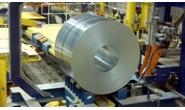Government/Policy

August 31, 2017
CORE Anti-Circumvention Determinations Delayed
Written by Sandy Williams
The Commerce Department has extended the deadline for determinations in the anti-circumvention investigation of corrosion-resistant steel from China to Feb. 15, 2018.
On Nov. 14, 2016, the anti-circumvention case was initiated on CORE steel products from the People’s Republic of China in response to a request from steel companies ArcelorMittal USA, Nucor, U.S. Steel, AK Steel, Steel Dynamics, Inc., and California Steel Industries.
The group charged that hot and cold rolled steel produced in China was being sent to Vietnam where it was processed into corrosion-resistant steel products and then sent to the U.S. under Vietnam origin, circumventing the AD/CVD duties placed on imports of steel from the PRC.
Commerce has determined that more time is necessary to solicit and analyze information related to the investigation.
Washington trade attorney Lewis Leibowitz was not surprised by the delay, noting the investigation was stalled for nearly six months. “There are two major issues in this case,” said Leibowitz, “China substrate and ‘substantial transformation.'”
Philip Bell, president of the Steel Manufacturers Association, acknowledged at SMU’s Steel Summit Conference that any exports from Vietnam could not be covered by circumvention unless Chinese substrate were used in the material coming to the U.S. SMA represents domestic EAF steel producers.
“That is absolutely correct, in my opinion,” said Leibowitz. “Commerce must accept this limitation on their authority to find circumvention or they will violate the law.”
“On substantial transformation, if HRC is imported into Vietnam, and CORE is entered into the U.S., there are at least two substantial transformations: hot rolled to cold rolled and cold rolled to coated, corrosion resistant steel. The applicable statute requires a finding that any addition to value in Vietnam must be ‘minor.’ It seems clear to me that a process that results in a substantial transformation cannot be ‘minor.’ That is an issue Commerce will need to address.
“Finally, the ability of WTO member countries to impose antidumping and countervailing duties on new countries through ‘circumvention’ is an open issue. No court has ruled on that one way or the other. Vietnam will surely challenge any such finding and could well prevail.”







